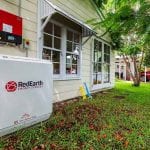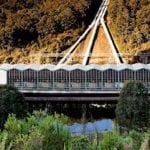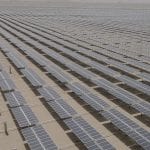Around The Web
Climate activists on how they think the crisis should be reported – video
The Guardian recently pledged to give the climate crisis the attention it demands. We believe it is important that our readers have a say in how the Guardian and the wider industry reports on the crisis, so we asked young people at the forefront of the fight to share their views
Australian offset panel weighs crediting mechanism for Safeguard facilities
Snail fail: Australia turns back Mercedes-Benz cars after escargot cargo found
Biosecurity officers shell-shocked after finding 30 snails never before detected in Australia
Nine-hundred Mercedes-Benz cars have been turned away at the Australian border after dozens of rare and exotic snails were found hiding inside their shipments.
More than 30 heath snails (Xerolenta obvia), which have never before been detected in Australia, were found by the Department of Agriculture in shipments of the luxury German car.
Continue reading...Nationals leader Michael McCormack acknowledges snafu over Hanson dairy deal
Politics with Michelle Grattan: Deputy PM Michael McCormack on the drought and restive Nationals
Plan for fracking 'years behind schedule' and has cost taxpayer £32m
Spending watchdog finds that only three wells have been dug, despite aim to have 20 by 2020
The government’s plan to establish fracking across the UK is years behind schedule and has cost the taxpayer at least £32m so far, Whitehall’s spending watchdog has found.
An investigation by the National Audit Office (NAO) said the shale gas industry has launched only three wells in three years, even though the plan was to establish 20 by the middle of next year.
Continue reading...Wildlife corridors to save Borneo elephants – in pictures
Malaysia and Indonesia are home to the oldest jungles in the world and produce more than 85% of the world’s palm oil. However, cultivation and production of the oil have caused deforestation, pollution, land degradation and human-wildlife conflict.
Deforestation in Malaysia and Indonesia has endangered the Borneo elephant, which depends on forest connectivity to survive, by isolating it from large foraging grounds. Now, some plantations are working with WWF-Malaysia to create ecological corridors to enable the animals to travel between forest patches
Continue reading...Pumpkin waste in UK predicted to hit scary heights this Halloween
More than 8m squashes likely to be binned after annual lantern carving, study shows
Britons are expected to generate record levels of food waste over Halloween this year.
More than 8m pumpkins – equivalent to more than 18,000 tonnes of edible pumpkin flesh – will be heading for the bin because the majority of consumers will not eat it.
Continue reading...Politicians must mine the divide between coal lobbies and energy companies
First 100% electric black cab for 120 years launches in London
Converted Nissan van called the Dynamo licensed to help clean up capital’s ‘filthy air’
The launch of a fully electric black cab for London has been hailed by the mayor for helping clean up the capital’s polluted air.
The Dynamo, a taxi converted from a Nissan electric van in a Coventry factory, is the first 100% electric taxi on the streets of London since 1899. Its predecessor, the Bersey, failed to take off at a time when most cabs were horse-drawn.
Continue reading...Sad mystery of elastic bands found on remote Cornish island solved
Seabird conservationists perplexed by discoveries on Mullion island work out depressing explanation
There isn’t a lot to Mullion island, a jagged outcrop of volcanic rock that rises out of a crystal-clear sea just off the Cornish coast. Nobody lives on the island and visitors need a permit to land.
So when conservationists who occasionally paddle across on kayaks to carry out seabird surveys began spotting brightly coloured elastic bands – thousands of them – there was a little bit of head-scratching.
Continue reading...CEFC and Pro-invest aim to deliver five star green treatment for new hotels
 The Fund is aiming for a 5-star NABERS energy rating for up to 15 new hotels it will own, develop and operate across Australia. It is also Australia’s first hospitality real estate fund to integrate energy sustainability in its investment criteria.
The Fund is aiming for a 5-star NABERS energy rating for up to 15 new hotels it will own, develop and operate across Australia. It is also Australia’s first hospitality real estate fund to integrate energy sustainability in its investment criteria.
The post CEFC and Pro-invest aim to deliver five star green treatment for new hotels appeared first on RenewEconomy.
Are political leaders afraid of admitting there is a positive solution to climate change?
 "A lot of the issues are around fear, and people finding political advantage of that fear. It doesn't really help."
"A lot of the issues are around fear, and people finding political advantage of that fear. It doesn't really help."
The post Are political leaders afraid of admitting there is a positive solution to climate change? appeared first on RenewEconomy.
Why the nuclear lobby makes stuff up about cost of wind and solar
 Nuclear lobby has been making such extraordinary and outrageous claims about wind, solar and batteries it makes you wonder if anything they say about energy can be taken seriously.
Nuclear lobby has been making such extraordinary and outrageous claims about wind, solar and batteries it makes you wonder if anything they say about energy can be taken seriously.
The post Why the nuclear lobby makes stuff up about cost of wind and solar appeared first on RenewEconomy.
Extending the price safety net
Water may soon lap at the door, but still some homeowners don't want to rock the boat
RedEarth Energy Storage earns Clean Energy Council approval for its Australian made and owned residential battery systems
 RedEarth is proud to announce its SunRise Home Battery system has been approved by Australia’s CEC, making it the first Australian made and owned product to be featured on the CEC’s approved list of inverters in the all-in-one BESS category.
RedEarth is proud to announce its SunRise Home Battery system has been approved by Australia’s CEC, making it the first Australian made and owned product to be featured on the CEC’s approved list of inverters in the all-in-one BESS category.
The post RedEarth Energy Storage earns Clean Energy Council approval for its Australian made and owned residential battery systems appeared first on RenewEconomy.
Snowy 2.0: Who will be held to account for this giant folly ?
 The buck for Snowy 2.0 stops with its two Shareholding Ministers, Angus Taylor and Mathias Cormann. It is time for these ministers to take the bull by the horns.
The buck for Snowy 2.0 stops with its two Shareholding Ministers, Angus Taylor and Mathias Cormann. It is time for these ministers to take the bull by the horns.
The post Snowy 2.0: Who will be held to account for this giant folly ? appeared first on RenewEconomy.
How much storage do we need for all this wind and solar?
 The Integrated System Plan is no more than a scenario guess-timator when it comes to fuel forecasting, but its insights into storage needs is interesting.
The Integrated System Plan is no more than a scenario guess-timator when it comes to fuel forecasting, but its insights into storage needs is interesting.
The post How much storage do we need for all this wind and solar? appeared first on RenewEconomy.
Trina shifts focus to Australia’s big solar market, grid delays and all
 Global PV giant shift Australia focus from residential to utility-scale and large C&I, with an integrated smart solar offering and a "very positive outlook" on the market.
Global PV giant shift Australia focus from residential to utility-scale and large C&I, with an integrated smart solar offering and a "very positive outlook" on the market.
The post Trina shifts focus to Australia’s big solar market, grid delays and all appeared first on RenewEconomy.



